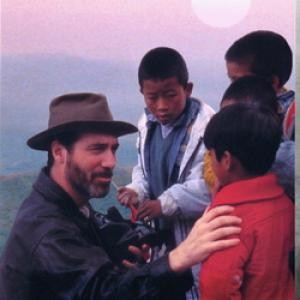
The Jew in the Lotus 1998
Distributed by New Day Films, 22-D Hollywood Ave., Hohokus, NJ 07423; 201-652-6590
Produced by Laurel Chiten and Lucia Small
Directed by Laurel Chiten
VHS, color, 60 min.
Adult
Multicultural Studies, Religious Studies, Psychology, Sociology, Media Studies
Date Entered: 11/09/2018
Reviewed by Debra Mandel, Head, Media Center, Northeastern University LibrariesThe Jew in the Lotus is a modern day journey into the mind and spirit. Rodger Kamenetz, a Jewish writer from Baltimore, was in the throes of great anguish when his close "Ju-Bu" friend , Marc Lieberman, urged him to visit Dharmasala, India to chronicle a meeting between American rabbis and the Buddhist leader, the 14th Dalai Lama. West meets East. Filmmaker Laurel Chiten expertly balances the film between Rodger's tale of self-renewal and the religious leaders' enfolding bond. In sharing a history of persecution, the Dalai Lama wanted to learn from the rabbis "the secret of spiritual survival in exile" for "the Tibetans are the Jews of our country." Historic black and white film depicts the Tibetans' exile from China in 1959.
Kamenetz's jittery angst is an ironic counterpoint to the film's transcendent nature. Yet that is what keeps The Jew in the Lotus, from becoming too doctrinaire. Chiten captures Kamenetz nervously pacing and talking about his anxieties. In imposing close-ups, she also includes frank interviews with his wife, sister, mother, and friend Marc, who lovingly analyze Rodger's personal struggles. Some of these interviews, bordering on scenes from Woody Allen's Take the Money and Run could have been eliminated without weakening the narrative.
Towards the end of Chiten's film we learn that Rodger's depression was due to the death of his baby and the devastating rejection by publishers of his book on this topic. At this point, the audience, perhaps tired with Rodger's self-absorption, can understand where he's coming from. In the spirit of his Indian cross-cultural experience, Rodger finally comes to terms with both his loss and his Jewish identity, and returns home renewed and full of joy. He published a book about his experience, The Jew in the Lotus: A Poet's Rediscovery of Jewish Identity in Buddhist India, achieves great success and popularity, goes on speaking engagements, and returns to India to give a copy of his work to the Dalai Lama. The film ends on a great note of hope, affirming that Jews and Buddhists will continue to support each other in their quests for survival.
Technically, The Jew in the Lotus is quite engaging, with a wide colorful range of filmic styles. There is excellent footage of bustling, exotic and impoverished India. There is also a good deal of unusual, experimental imagery, which sometimes strains for affect, but works. A varied soundtrack includes pulsating Indian music, Buddhist chants, Mendelssohn, and Hebrew prayers.
The Jew in the Lotus, is a difficult film to categorize. It deals less with the facts of Judaic and Buddhist theologies, than it does with the universal themes of human growth, development, and spiritual enlightenment. It may find a niche in college level classes and film screenings in multiculturalism, religion, psychology, sociology, and cinema studies. It will certainly lead to interesting discussions.
Highly recommended for academic and public library collections.